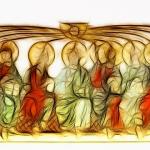A colleague shared with me issue 56 of Philosophy Now magazine, which was devoted to the subject of heresy. If you can get access to it, there is a great cartoon by Chris Madden on p.27, a variation on another of his famous cartoons.
Since I can’t share the cartoon, I’ll have to settle for sharing a quote: “Religions are kept alive by heresies, which are really sudden explosions of faith. Dead religions do not produce them” (Gerald Brenan, Thoughts In A Dry Season, quoted in the aforementioned issue of Philosophy Now, p.7).
I found myself thinking about Gnosticism over the past few days. In one sense, most educated Christians today are probably ‘gnostics’ in the sense in which Clement of Alexandria used the term, just by virtue of being educated in a way most Christians down the ages never had the opportunity to be; and as a result, reflecting on our faith in relation to questions raised by our knowledge.
Taken symbolically rather than literally, it is much easier to appreciate many things the Gnostics (in the usual ‘full’ sense, with a capital ‘G’) had to say. On the one hand, they are dealing with the data the ‘intelligent design’ crowd are, but much more honestly. On the one hand, they had no way to account for apparent design than by appeal to a deity’s direct action; on the other hand, they took the evidence of less than perfect design fully seriously too, and thus reached the conclusion that the creation is the work of an inferior demiurge. In a sense, Christians who accept evolution have something in common with these ancient Gnostics: a willingness to let the evidence lead wherever it takes us, even if that means acknowledging that the creation is not a direct artifice of God most high, but the work of an at times inept (yet nevertheless clearly skillful) creator, in this case evolution rather than a personal demiurge.
Gnosticism also takes seriously what mystics have always claimed, namely that beyond the anthropomorphic deity of Scriptures and doctrines there is a reality that transcends such language and conceptualization, which is infinitely greater. When one ascends past that (image of) god, one finds that beyond it there is so much more to be ineffably known and experienced. Paul Tillich referred to this ultimate reality in terms the Gnostics would have been happy with, as “the God beyond God“.
Taken literally, Gnosticism’s system probably lacks any real appeal to most people today. There are alternative systems that seem preferable. But taken symbolically, as with any religious tradition, there are important questions it raises, and much to be learned in the process.
















